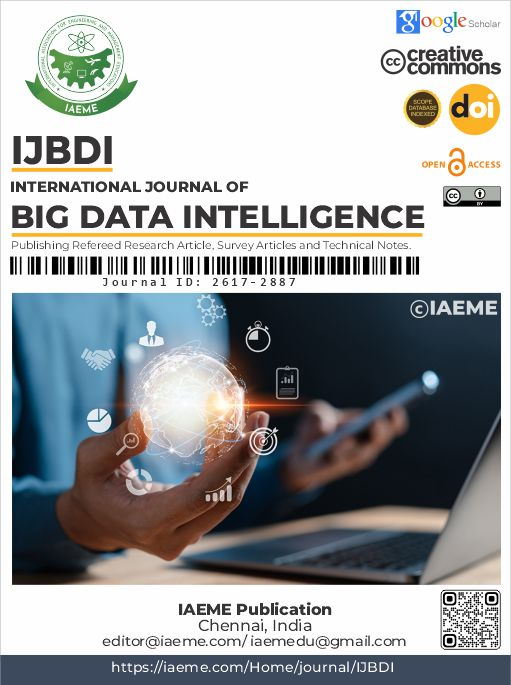UNDERSTANDING THE INFLUENCE OF BIG DATA ON COGNITIVE COMPUTING AND ARTIFICIAL INTELLIGENCE EVOLUTION
Keywords:
Big Data, Cognitive Computing, Machine Learning, Natural Language Processing, Autonomous Systems, Data Integration, Data Quality, Ethical Considerations, Technological EvolutionAbstract
Big Data has emerged as a critical driver in the evolution of cognitive computing and artificial intelligence, transforming how these technologies are developed and applied. This paper explores the profound impact of Big Data on cognitive systems, particularly in enhancing machine learning models, improving natural language processing capabilities, and enabling more sophisticated autonomous systems. The research delves into the historical context of cognitive computing and examines how the vast amounts of data generated in the digital age have been leveraged to advance these technologies. The paper also discusses the challenges associated with data quality, integration, and ethical considerations, offering insights into future trends that may shape the continued convergence of Big Data with cognitive computing. Through this analysis, the research highlights the essential role that Big Data plays in pushing the boundaries of what cognitive systems can achieve, ultimately contributing to more intelligent and responsive technological solutions.
References
Binns, R. (2018). Fairness in machine learning: Lessons from political philosophy. Proceedings of the 2018 Conference on Fairness, Accountability, and Transparency, 149-159.
Chen, M., Mao, S., & Liu, Y. (2014). Big Data: A survey. Mobile Networks and Applications, 19(2), 171-209.
Dean, J., & Ghemawat, S. (2008). MapReduce: Simplified data processing on large clusters. Communications of the ACM, 51(1), 107-113.
Vinay SB (2024) Generative AI for patent mining: synthesizing insights from intellectual property data. Int J Generative AI (IJGAI) 1(1):1–5
Sandeep P, Kannan N (2016) Role of employee demographics and work preferences in the new product development in fabrication engineering industry. Int J Civ Eng Technol 7(4):565–575
Ramachandran KK, Madhumathy M (2016) A study on capital structure and financial performance of Indian textile industry. Int J Manag 7(3):313–322
Sivakumar N, Sivaraman P, Tamilselvan N (2013) Usage of ICT products and services for researchers in Kalaignar Karunanidhi Institute of Technology (KIT) Library. Int J Libr Inf Sci (IJLIS) 1(2):1–10
Doshi-Velez, F., & Kim, B. (2017). Towards a rigorous science of interpretable machine learning. arXiv preprint arXiv:1702.08608.
Floridi, L., Cowls, J., Beltrametti, M., Chatila, R., Chazerand, P., Dignum, V., ... & Vayena, E. (2018). AI4People—An ethical framework for a good AI society: Opportunities, risks, principles, and recommendations. Minds and Machines, 28(4), 689-707.
Halevy, A., Norvig, P., & Pereira, F. (2009). The unreasonable effectiveness of data. IEEE Intelligent Systems, 24(2), 8-12.
Kairouz, P., McMahan, H. B., Avent, B., Bellet, A., Bennis, M., Bhagoji, A. N., ... & Zhao, S. (2019). Advances and open problems in federated learning. arXiv preprint arXiv:1912.04977.
Laird, J. E., Newell, A., & Rosenbloom, P. S. (1987). Soar: An architecture for general intelligence. Artificial Intelligence, 33(1), 1-64.
LeCun, Y., Bengio, Y., & Hinton, G. (2015). Deep learning. Nature, 521(7553), 436-444.
Manning, C. D., Raghavan, P., & Schütze, H. (2008). Introduction to Information Retrieval. Cambridge University Press.
McCarthy, J. (1956). The concept of a corporation. Harvard Business Review.
Russell, S., & Norvig, P. (2003). Artificial Intelligence: A Modern Approach (2nd ed.). Prentice Hall.
Rumelhart, D. E., Hinton, G. E., & Williams, R. J. (1986). Learning representations by back-propagating errors. Nature, 323(6088), 533-536.
Sambasivan, N., Kapania, S., Highfill, H., Akrong, D., Paritosh, P., & Aroyo, L. (2021). Everyone wants to do the model work, not the data work: Data Cascades in High-Stakes AI. Proceedings of the 2021 CHI Conference on Human Factors in Computing Systems, 1-15.
Downloads
Published
Issue
Section
License
Copyright (c) 2024 N.Kannan (Author)

This work is licensed under a Creative Commons Attribution-NonCommercial 4.0 International License.

